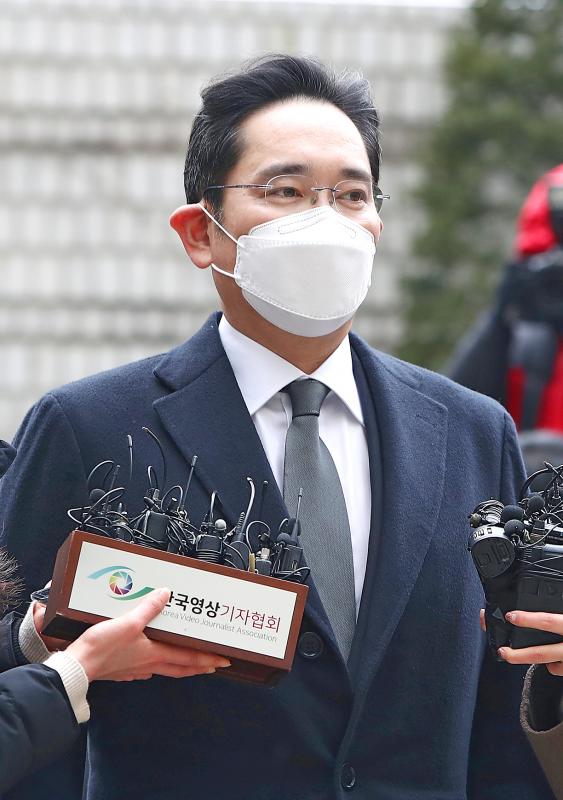The de facto chief of South Korea’s Samsung business empire was yesterday convicted over a huge corruption scandal and jailed for two-and-a-half years, in a ruling that deprives the tech giant of its top decisionmaker.
Jay Y. Lee, vice chairman of Samsung Electronics Co, the world’s biggest smartphone and memorychip maker, was found guilty of bribery and embezzlement in connection with the scandal that brought down former South Korean president Park Geun-hye.
Lee “actively provided bribes and implicitly asked the president to use her power to help his smooth succession” at the head of the sprawling conglomerate, the Seoul Central District Court said in its verdict.

Photo: EPA-EFE
“It is very unfortunate that Samsung, the country’s top company and proud global innovator, is repeatedly involved in crimes whenever there is a change in political power,” it said.
It concluded a retrial that was the latest step in a long-running legal process that has hung over Samsung for years.
The multibillionaire Lee — who had earlier walked into court grim-faced and wearing a mask, without responding to reporters’ shouted questions — was immediately taken into custody.
He has effectively been at the head of the Samsung Group for several years after his father was left bedridden by a heart attack, finally dying in October.
“This is essentially a case where the freedom and property rights of a company were violated by the former president’s abuse of power,” Lee’s lawyer, Lee In-jae, told reporters.
“Given the nature of the matter, I find the court’s ruling regrettable,” he said.
Experts say the sentence would create a leadership vacuum that could hamper Samsung’s decisionmaking on large-scale investments.
“It’s really a huge blow and a big crisis for Samsung,” said Kim Dae-jong, a business professor at Sejong University.
Samsung Electronics, the group’s flagship subsidiary, declined to comment on the ruling.
“Considering Samsung’s share of the [South] Korean economy and its status as a global company, the ruling is feared to have a negative impact on the overall [South] Korean economy,” the Federation of Korean Industries said in a statement.

FREEDOM OF NAVIGATION: The UK would continue to reinforce ties with Taiwan ‘in a wide range of areas’ as a part of a ‘strong unofficial relationship,’ a paper said The UK plans to conduct more freedom of navigation operations in the Taiwan Strait and the South China Sea, British Secretary of State for Foreign, Commonwealth and Development Affairs David Lammy told the British House of Commons on Tuesday. British Member of Parliament Desmond Swayne said that the Royal Navy’s HMS Spey had passed through the Taiwan Strait “in pursuit of vital international freedom of navigation in the South China Sea.” Swayne asked Lammy whether he agreed that it was “proper and lawful” to do so, and if the UK would continue to carry out similar operations. Lammy replied “yes” to both questions. The

‘OF COURSE A COUNTRY’: The president outlined that Taiwan has all the necessary features of a nation, including citizens, land, government and sovereignty President William Lai (賴清德) discussed the meaning of “nation” during a speech in New Taipei City last night, emphasizing that Taiwan is a country as he condemned China’s misinterpretation of UN Resolution 2758. The speech was the first in a series of 10 that Lai is scheduled to give across Taiwan. It is the responsibility of Taiwanese citizens to stand united to defend their national sovereignty, democracy, liberty, way of life and the future of the next generation, Lai said. This is the most important legacy the people of this era could pass on to future generations, he said. Lai went on to discuss

MISSION: The Indo-Pacific region is ‘the priority theater,’ where the task of deterrence extends across the entire region, including Taiwan, the US Pacific Fleet commander said The US Navy’s “mission of deterrence” in the Indo-Pacific theater applies to Taiwan, Pacific Fleet Commander Admiral Stephen Koehler told the South China Sea Conference on Tuesday. The conference, organized by the Center for Strategic and International Studies (CSIS), is an international platform for senior officials and experts from countries with security interests in the region. “The Pacific Fleet’s mission is to deter aggression across the Western Pacific, together with our allies and partners, and to prevail in combat if necessary, Koehler said in the event’s keynote speech. “That mission of deterrence applies regionwide — including the South China Sea and Taiwan,” he

UNPRECEDENTED: In addition to the approved recall motions, cases such as Ma Wen-chun’s in Nantou are still under review, while others lack enough signatures The Central Election Commission (CEC) announced yesterday that a recall vote would take place on July 26, after it approved the first batch of recall motions targeting 24 Chinese Nationalist Party (KMT) lawmakers and Hsinchu Mayor Ann Kao (高虹安). Taiwan is in the midst of an unprecedented wave of mass recall campaigns, following a civil society push that echoed a call made by Democratic Progressive Party (DPP) caucus whip Ker Chien-ming (柯建銘) in January to initiate signature drives aimed at unseating KMT legislators. Under the Civil Servants Election and Recall Act (公職人員選舉罷免法), Taiwanese can initiate a recall of district-elected lawmakers by collecting